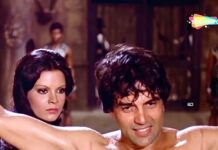Like most other fantasy dramas, Game of Thrones is set up in the medieval era. What makes it different from other story-lines is that Game of Thrones marks a departure from a highly centralized political setup, where all the powers reside with the monarch, the whole state is under his rule and he always has a standing army.
The reason why Game of Thrones is set in a feudal backdrop may be the fact that medieval Europe too had a feudal setup and George R. R. Martin, writer of the show, is known for his realism. Also monarchy has already got its share of romanticism.

Here are some typical characteristics of feudalism seen in Game of Thrones that makes the show so interesting.
Social Hierarchy
The King is on top of the social political hierarchy (the one who sits on the Iron Throne), followed by the Lords, Earls, Knights, and commoners in strict descending order.
Another category would be highborn and lowborn.
A highborn is born in a prestigious family eg. Lannister, Stark. They are expected to rule and have a refined sense of speech and dressing.
Anyone who is not a highborn is a lowborn. People who move up the social ladder might still be seen as a lowborn. For instance, Ser Davos is a lowborn who moved up the ladder, but is still scorned by other members of the nobility.
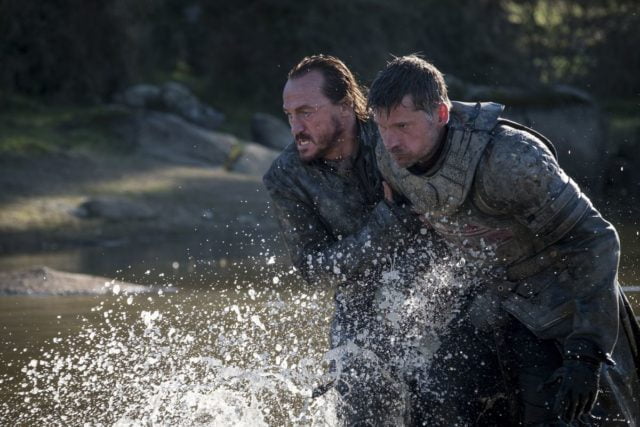
Let’s take the example of Bronn. He started off as a low rank sellsword, but rose in ranks and amassed wealth and titles because he used his skills, particularly for the Lannisters.
Granting lands and titles
Feudalism is derived from the word ‘fief’ which loosely means a rented land or state. In a feudal system, the King holds all the land.
He grants pieces of land and titles to his vassals in exchange of loyalty. This vassal does the same to his subordinate vassal, who in return, does the same with someone more subordinate.
This forms a complicated chain of loyalties. For instance, House Bolton pledged to House Stark, who had pledged to the Iron Throne (Robert Bareathon).
But when House Stark rebelled, the Boltons conspired against the Starks, with the Lannisters to take over the North. Did I mention that loyalties run loose in feudalism?
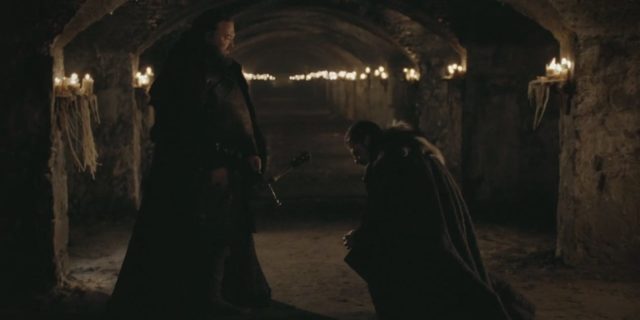
As for the land, the North does not belong to Starks, it has been given out to them in exchange of loyalty, taxes and military help, whenever the Iron Throne demands for it.
Remember, Robb Stark was called the ‘King of the North’ when the North was rebelling against the Iron Throne. Otherwise, Nedd Stark was called the ‘Warden of the North’.
Also Read: Breakfast Babble: How I Gave Into The Hype That I Thought Was Game Of
Army, or the lack of it
While despotism and revolts are common in all kinds of systems, the military is particularly different in feudalism. Ever wondered why the Kings of Game of Thrones don’t have a standing army?
In a feudal setup, the King and Lords are dependent on his vassals for protection. The latter provides the former with men, the number of men can vary from vassal to vassal. This was because keeping an army is an expensive affair. So the noble men essentially act as a military class.
Also, in a feudal setup, the King yields limited powers because all his decisions are tethered to his ‘coalition’ of vassals.
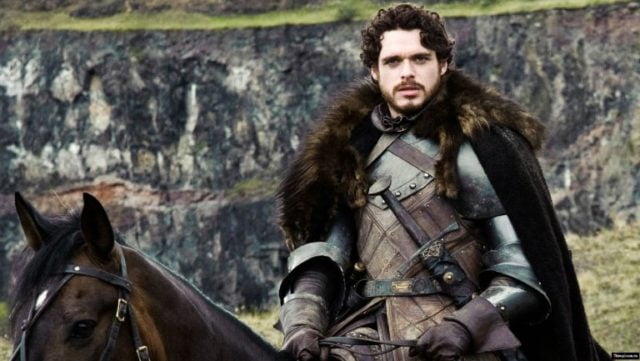
For instance, when Robb Stark was rebelling against the Iron Throne, his army consisted of 3000 men from the House of Stark and 3000 men from that of Karstark.
When Robb executed Lord Karstark for treason, the 3000 men of Karstark returned back, substantially reducing Robb’s military power.
Another example would be how before every war Houses (who are vassals to their Lords) pledge a certain number of men to their Lords or King.
Knighthood
Knighthood is another typical characteristic of feudalism. Jamie Lannister’s whole character revolves around this title.
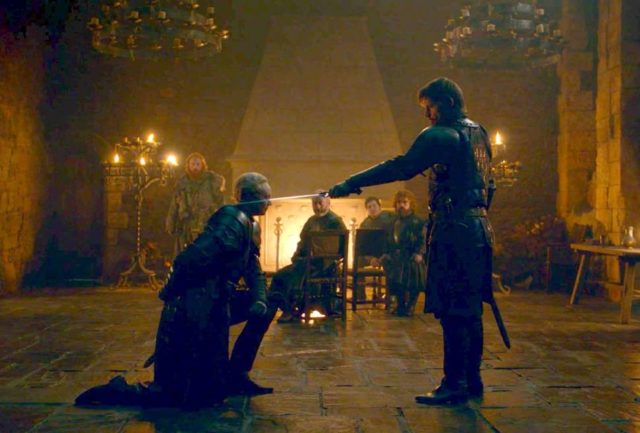
Also, more recently, Jamie knighted Lady Brienne of Tarth. The priceless expression the cast donned during this ceremony and the very fact that a whole episode was named for this very title shows its importance.
House name
Loyalty towards one’s own House name seems of be more important than any other loyalty. For instance, no one calls him/herself a Westrosi in the show, but only by their respective House name.
And remember how Catelyn Stark called herself of the House Tully, even after getting married to Ned Stark. Or Samwell asks Mormont to yield his family sword to keep his House name’s pride.
It must be quite clear now that feudalism is the fundamental plot of Game of Thrones. Not only does the show have a feudal setup, the story-line is propelled by the same.
Imagine how boring the show would have been had it followed a monarchical political system.
Robert Baratheon would never have dethroned the Targaryens and the main story-line might have been a power struggle between the Targaryen brothers.
Would you have watched this alternate show? Let us know in the comment section below.
Image Credits: Google Images
Source: Game of Thrones, Infoplease.com, Historydiscussion.net
Find the blogger @parihar_tweets
You’d also like to read:




























